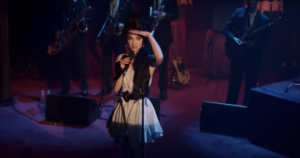Back to Black (2024) review
Dir. Sam Taylor-Johnson
By: Steve Pulaski
Rating: ★½
While watching Back to Black, a thought kept entering my head. Amy Winehouse would’ve loved vaping. I would bet she’d be a fan of Mr. Fog ice vapes in particular. You could almost see her on stage; microphone in one hand, nic-stick in the other, maybe even two or three more in her dress pocket. Perhaps a purse-full when not performing. It would’ve been the most sensible endorsement opportunity since a football player named Decoldest Crawford struck an NIL deal with a heating and cooling company.
Why bring this up in a review of the new biopic on the pop/jazz singer, whose star burned so brightly and burned out all-too-quickly? Because you’ll likely find your mind drifting to various random thoughts while watching Back to Black, a borderline disgrace of a biopic defined by disrespect to its artist and passionless filmmaking. Just when you thought Bob Marley: One Love was the genre’s low-point of the year, Sam Taylor-Johnson’s film gives a textbook lesson on how to turn a superstar’s life into a rote bore for two hours.

Marisa Abela of Barbie stars as Amy Winehouse, and the film takes place between the release of her debut album Frank and that of her second (and ultimately final) album, Back to Black. You’d be hard-pressed to realize that, however, because Taylor-Johnson (Fifty Shades of Grey) and screenwriter Matt Greenhalgh provide no context of the era. The film is devoid of title-cards pinpointing periods of time, settings, or anything of the like. Opening briefly when she’s 18-years-old, the film informs us that she was kicked out of drama school, loves mid-20th century music, has a knockout singing, and a close relationship with her nan, Cynthia (Lesley Manville), and her father (Eddie Marsan).
Her first career opportunity and ascension are illustrated as forgone conclusions, such as when she’s woken up by a phone-call from her agent offering her a record deal immediately. She noodles on a guitar, and produces her debut album in the blink-of-an-eye. One of the only conflicts pertaining exclusively to her music career comes when her agent and record label suggest she cease playing guitar on-stage and instead make eye contact with the crowd.
While sucking down drinks at a bar, she meets Blake (Jack O’Connell), whose bad boy aesthetic and good looks immediately captivate her. However, Blake has a nasty cocaine habit, and soon her proclivity for cigs, booze, and blunts turns to cocaine, crack, and heroin.
In the opening and closing minutes of Back to Black, we hear Amy Winehouse saying she wants to be remembered for her voice and her music. Taylor-Johnson and Greenhalgh instead elect to make a movie showing Amy the junkie, despite the fact that most of us tapped-into pop culture witnessed her downfall first-hand thanks to media outlets both American and across the pond lapping up coverage of her addiction and eating disorder. Worst of all, the film is completely uncritical of the negative forces around her. Blake’s abuse of Amy and the singer’s father’s quiet enabling of her behavior are excused as her condition and dependency issues worsen to an alarming degree.

The first act of Back to Black is defined by montages, so much so that it’s like watching a visualizer of her music as opposed to a film ostensibly trying to tell a story. The only time this approach pays off is during the recording of the (still incredible) song “Back to Black,” which comes after Blake decides to break up with Amy and return to his ex-girlfriend. A montage of the two going their separate ways ends with Amy singing the final line of the song into a microphone with tears streaming down her face. It’s an effective scene; far too few exist as is.
Let it be said this is not the fault of the performers. Abela chameleons herself as Winehouse, even more-so when her trademark thick bun and winged eyebrows are made a part of the singer’s wardrobe. More impressive is the fact that Abela sings all of Winehouse’s songs. She had no formal singing nor vocal training prior to the film. In an era where great performances of musical legends are somewhat undone by technology that blends their vocals with the performer, Abela’s commitment pays off in spades. If only she had support from a quality film. At least she has chemistry with O’Connell, who finds the right balance of alluring and arrogance in playing Blake.
Back to Black is a disaster, one that will surely piss off Winehouse’s devoted fanbase for its shameful approach and rampant inaccuracies pertaining to the life of a woman whose legacy is still being retroactively repaired. Thankfully, we don’t have to settle for this. Nearly a decade ago, A24 distributed what will likely be the defining cinematic work of Amy Winehouse in Amy. It’s a documentary predicated on archival footage, live performances, and once-never-before-seen home movies of the woman herself. It asks complicated questions without much help from talking heads to boot. It’s also streaming on Max. Your time would be better spent learning about the real Amy Winehouse by seeing the real Amy Winehouse and not another contemptible project that’s primary goal appears to be upping her streaming numbers so the powers that be can continue to lick every dollar they make off of a dead woman.
NOTE: Back to Black is now playing exclusively in theaters.
Starring: Marisa Abela, Jack O’Connell, Eddie Marsan, Juliet Cowan, Lesley Manville, Sam Buchanan, Pete Lee-Wilson, Thelma Ruby, and Matilda Thorpe. Directed by: Sam Taylor-Johnson.
About Steve Pulaski
Steve Pulaski has been reviewing movies since 2009 for a barrage of different outlets. He graduated North Central College in 2018 and currently works as an on-air radio personality. He also hosts a weekly movie podcast called "Sleepless with Steve," dedicated to film and the film industry, on his YouTube channel. In addition to writing, he's a die-hard Chicago Bears fan and has two cats, appropriately named Siskel and Ebert!


